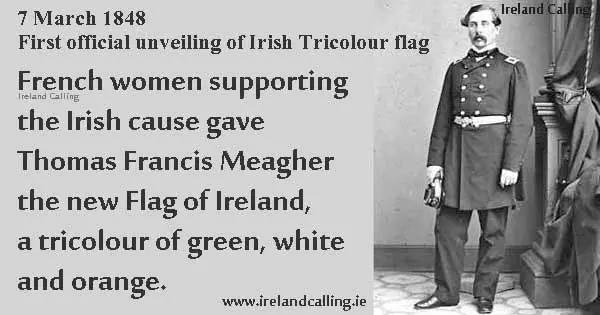Thomas Meagher was a leading Irish nationalist who took part in the 1848 Young Irelander Rebellion and brought the tricolour flag of greeen, white and orange to Ireland from France.
He was sentenced to penal servitude for his part in the rebellion but escaped to the United States where he became a prominent figure in Irish American politics.
He fought in the American Civil War and went on to become the Governor of Montana Territory.
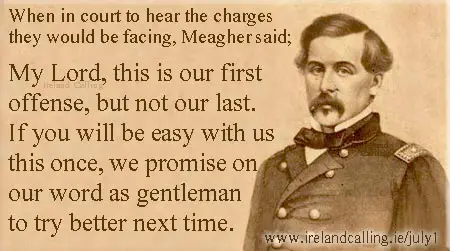
Thomas Meagher was born on 3 August 1823 in Waterford in what is now the Granville Hotel. His father was a wealthy landowner and a prominent figure in the Waterford community.
Meagher received a first class education in both Ireland and England. This gave him an Anglo-Irish accent, which left some of his countrymen unimpressed when he entered public life in the 1840s.
These were the years of the ‘Great Famine’ when suffering in Ireland was at an all-time high and there was huge resentment towards the British.
Meagher became involved in local politics and was influenced by Irish newspapers like The Nation.
He began speaking at local meetings where his eloquence and charisma shone through, and he became a big attraction with meeting halls full on the nights he addressed the crowd.
The English twang in Meagher’s accent was overlooked by his countrymen, as his speeches were so engaging and inspiring.
Member of the Young Ireland movement
Meagher became a leading figure in the Young Ireland movement, the name given by Daniel O’Connell to the young men driving for a Repeal of the Act of Union, and achieving independence from Britain.
The Young Irelanders were viewed by some politicians as a violent gang of thugs, using the campaign for Irish independence as an excuse to carry out violent attacks on the British.
In fact, the Young Irelanders had not yet turned to violent means, and were trying to achieve their aim peacefully.
When Meagher was asked about the Young Irelanders’ intentions he issued a speech stating that he didn’t believe violence was the best course of action for the Irish nationalists.
However, he added that in some cases, violent uprisings had been successful and he understood the feeling of patriotism that makes men willing to fight for their country. It became known as the ‘Swords Speech’.
Extract of the Swords Speech
“My lord, it was once said by an eminent citizen of Rome, the elder Pliny, that “we owe our youth and manhood to our country, but we owe our declining age to ourselves.” This may have been the maxim of the Roman—it is not the maxim of the Irish patriot. One might have thought that the anxieties, the labours, the vicissitudes of a long career had dimmed the fire which burned in the heart of the illustrious old man whose words I have cited; but now, almost from the shadow of death, he comes forth with the vigour of youth and the authority of age, to serve the country, in the defence of which he once bore arms, by an example, my lord, that must shame the coward, rouse the sluggard, and stimulate the bold.
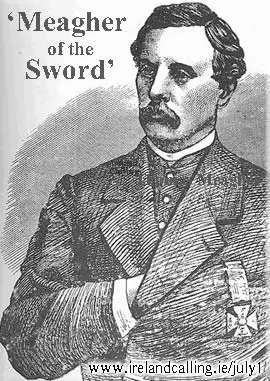
“These sentiments have sunk deep into the public mind. They are recited as the national creed. I was speaking of the true sentiments which should animate the people. Inspired by such sentiments, the people of this country will look beyond the mere redress of existing wrongs, and strive for the attainment of future power.
“A good government may, indeed, redress the grievances of an injured people; but a strong people alone can build up a great nation. To be strong a people must be self-reliant, self-ruled, self-sustained. The dependency of one people upon another, even for the benefits of legislation, is the deepest source of national weakness. By an unnatural law it exempts a people from their first duties—their first responsibilities.
“When you exempt a people from these duties, from these responsibilities, you generate in them a distrust in their own powers—thus you enervate, if you do not utterly destroy, that bold spirit which a sense of these responsibilities is sure to inspire, and which the exercise of these duties never fails to invigorate.
“Where this spirit does not actuate, the country may be tranquil—it will not be prosperous. It may exist—it will not thrive. It may hold together—it will not advance. Peace it may enjoy, for peace and serfdom are compatible. But, my lord, it will neither accumulate wealth nor win a character. It will neither benefit mankind by the enterprise of its merchants, nor instruct mankind by the examples of its statesmen.
“On the evening of the 16th, the Whig premier, in answer to a question that was put to him, is reported to have made this consolatory announcement “We consider that the social grievances of Ireland are those which are most prominent—and to which it is most likely to be in our power to afford, not a complete and immediate remedy, but some remedy, some kind of improvement, so that some kind of hope may be entertained that some ten or twelve years hence the country will, by the measures we undertake, be in a far better state with respect to the frightful destitution and misery which now prevails in that country. We have that practical object in view.”
“After that most consolatory announcement, my lord, let those who have the patience of Job and the poverty of Lazarus, continue in good faith “to wait on Providence and the Whigs”—continue to entertain “some kind of hope” that if not “a complete and immediate remedy,” at least “some remedy,” “some improvement,” will place this country in “a far better state” than it is at present, “some ten or twelve years hence.
“Let those plod on in sluggish misery, rotting from sire to son, from age to age, proud of their trampled nature.
“But we, my lord, who are assembled in this Hall, and in whose hearts the Union has not bred the slave’s disease—we have not been imperialised. I came here to Repeal the Act of Union—I came here for nothing else.
“The right of free opinion I have here upheld: in the exercise of that right I have differed, sometimes, from the leader of this Association, and would do so again. That right I will not abandon; I will maintain it to the last. In doing so, let me not be told that I seek to undermine the influence of the leader of this Association, and am insensible to his services. My lord, I will uphold his just influence, and I am grateful for his services. This is the first time I have spoken in these terms of that illustrious Irishman, in this Hall. I did not do so before—I felt it was unnecessary. I hate unnecessary praise: I scorn to receive it—I scorn to bestow it.
“God gave to me a mind that is my own—a mind that has not been mortgaged to the opinions of any man or any set of men; a mind that I was to use, and not surrender.
“In the existing circumstances of the country an incitement to arms would be senseless, and, therefore, wicked. To talk, now-a-days, of repealing the Act of Union by the force of arms, would be to rhapsodise. If the attempt were made, it would be a decided failure. There might be riot in the street—there would be no revolution in the country. Our esteemed under-secretary, Mr. Crean, will more effectively promote the cause of Repeal by registering votes in Green Street, than registering fire-arms in the Head-Police Office.
“There are times when arms will alone suffice, and when political ameliorations call for a drop of blood, and many thousand drops of blood. Opinion, I admit, will operate against opinion. But, as the honourable member for Kilkenny observed, force must be used against force. The soldier is proof against an argument, but he is not proof against a bullet. The man that will listen to reason, let him be reasoned with; but it is the weaponed arm of the patriot that can alone avail against battalioned despotism. Then, my lord, I do not disclaim the use of arms as immoral, nor do I believe it is the truth to say, that the God of heaven withholds his sanction from the use of arms.
“Be it for the defence, or be it for the assertion of a nation’s liberty, I look upon the sword as a sacred weapon. And if, my lord, it has sometimes reddened the shroud of the oppressor—like the anointed rod of the high priest, it has, as often, blossomed into flowers to deck the freeman’s brow. Abhor the sword? Stigmatise the sword? No, my lord.”
The speech was a cause for concern for O’Connell and his supporters. Although Meagher stated that he didn’t think violence was right for the Young Irelanders’ cause at that time, he did suggest that they would be willing to use it if their aims couldn’t be achieved peacefully.
Meagher travels to France
Meagher became one of the leaders of the Young Irelanders. They broke away from Daniel O’Connell’s repeal organisation, as they felt he was too willing to make concessions to the British government in the fight for Irish freedom.
Meagher travelled to France to learn more about the recent revolution that had taken place there. He was given a flag by some French women who sympathised with the Irish cause, the tricolour that is now the Irish national flag.
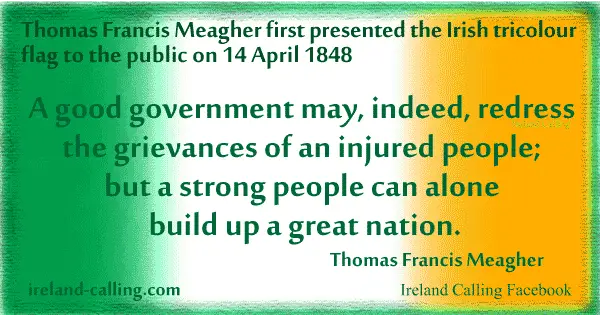
Failed rebellion of 1848
Meagher returned to Ireland and continued to gather support for his Young Irelanders. This momentum culminated in the failed rebellion of 1848, which was actually only one incident that was unplanned and badly advised.
Meagher and his fellow leaders were by this time wanted for arrest. They sought refuge in a village in Tipperary and were guarded by a large group of rebels.
A police unit approached to arrest Meagher, and upon seeing the large number of rebels attempted to enter the village by going around them. The rebels spotted the police and chased them across fields.
The police fled to a large farmhouse and barricaded themselves inside. The house had four children inside, but the police wouldn’t allow them to leave, or allow their mother to come in.
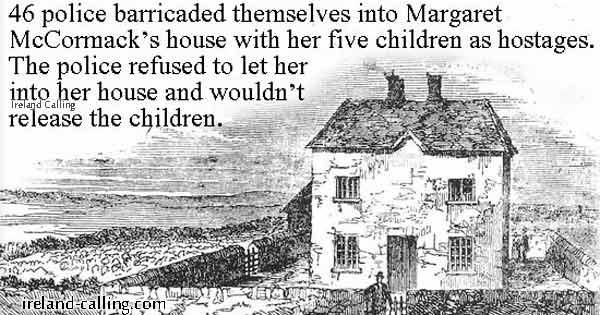
The rebels surrounded the house but no shots were fired because of the children inside. William Smith O’Brien, one of Meagher’s fellow leaders, attempted to negotiate the peaceful surrender of the policemen.
O’Brien went around the back of the house and spoke to them through a window.
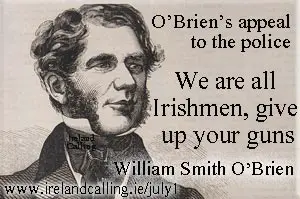
He reportedly said to them: “We are all Irishmen—give up your guns and you are free to go.” He then shook hands with some of the policemen, believing they had reached an agreement.
William Smith O’Brien shot by police
O’Brien was then shot by the police. It was reported to be the first shot fired by either side. The rebels were furious one of their men had been shot without provocation and opened fire on the house.
The police returned in kind and a chaotic gunfight followed with little movement from either side. The rebels realised the police’s position was impenetrable and were forced to flee the scene when they saw police reinforcements travelling towards them.
Meagher was arrested for his part in the conflict, along with his fellow leaders.
When they were taken to court to hear the charges they would be facing, Meagher said to the judge: “My Lord, this is our first offence, but not our last. If you will be easy with us this once, we promise on our word as gentleman to try better next time.”
During his trial, Meagher made a moving speech shortly before his sentence was passed. He knew he was going to be sentenced to death. It is known as the ‘Speech from the Dock’.
Extract from ‘Speech from the Dock’
“My lords, it is my intention to say a few words only. I desire that the last act of a proceeding which has occupied so much of the public time, should be of short duration.
“With my countrymen I leave my memory, my sentiments, my acts, proudly feeling that they require no vindication from me this day. A jury of my countrymen, it is true, have found me guilty of the crime of which I stood indicted. For this I entertain not the slightest feeling of resentment towards them. Influenced as they must have been by the charge of the Lord Chief Justice, they could perhaps have found no other verdict.
“But I would earnestly beseech of you, my lord—you who preside on that bench—when the passions and the prejudices of this hour have passed away, to appeal to your own conscience, and ask of it, was your charge what it ought to have been, impartial and indifferent between the subject and the crown?
“My lords, you may deem this language unbecoming in me, and perhaps it may seal my fate, but I am here to speak the truth, whatever it may cost—I am here to regret nothing I have ever done, to retract nothing I have ever said—I am here to crave with no lying lip the life I consecrate to the liberty of my country. Far from it!
“Even here—here, where the thief, the libertine, the murderer, have left their foot-prints in the dust. Here, on this spot, where the shadows of death surround me, and from which I see my early grave in an un-anointed soil open to receive me. Even here encircled by these terrors, that hope which first beckoned me to the perilous sea on which I have been wrecked, still consoles, animates and enraptures me.
“No; I do not despair of my poor old country—her peace, her liberty, her glory. For that country I can do no more than bid her hope. To lift this island up—make her a benefactor to humanity, instead of being as she is now, the meanest beggar in the world—to restore to her, her native powers and her ancient constitution—this has been my ambition and this ambition has been my crime. Judged by the law of England, I know this crime entails upon me the penalty of death; but the history of Ireland explains that crime and justifies it.
“Judged by that history, the treason of which I stand convicted loses all its guilt, has been sanctified as a duty, and will be ennobled as a sacrifice. With these sentiments I await the sentence of the court. I have done what I felt to be my duty. I have spoken now, as I did on every other occasion during my short life, what I felt to be the truth.
“Proceed, then my lords, with that sentence which the law directs—I am prepared to hear it—I trust I am prepared to meet its execution. I shall go, I think, with a light heart before a higher tribunal—a tribunal where a Judge of infinite goodness, as well as of infinite justice, will preside, and where, my lords, many, many of the judgements of this world will be reversed.”
Meagher sent to Van Diemen’s Land and escaped

Meagher’s death sentence was reduced to life on the labour camp of Van Diemen’s Land in Australia following international pressure for clemency. He married in Australia and managed to escape to the United States.
He had to leave his wife behind as she was heavily pregnant. She had the baby but it died shortly after birth. She later moved to Ireland after a brief stay in America with Meagher. She had his second child and lived with Meagher’s family in Ireland until her death.
Readers of Irish News ‘tried’ Meagher
Meagher married again in America, and joined up with his former Young Irelander and Van Diemen’s Land escapee John Mitchel. The two formed the Irish News and began writing to generate support for the Irish cause in America.
In a discussion about honour, Meagher offered to be ‘tried’ by his readers for his past actions. He vowed to return to Van Diemen’s Land if they saw fit.
Fortunately for him, they found his actions to have been honourable throughout, and he didn’t have to make good on his promise.
Meagher fought in the American Civil War for the Union
He joined the US militia and fought in the American Civil War for the Union. Meagher felt that it was his duty to fight for America as the country had made him welcome, given him a living and a second chance in life.
After the war ended, Meagher was rewarded for his actions by being given the job of Secretary of the new Territory of Montana.
He struggled in this role, with all his political experiences being in fighting for freedom. He found it difficult settling disputes in a fair way, and the territory was awash with settlers hoping to cash in on the gold rush.
This caused numerous conflicts between the Western settlers and the local American Indian tribes, and Meagher was criticised for his handling of events.
Meagher drowned in River Missouri
Thomas Meagher died on 1 July in 1867 after falling from his boat into the Missouri River and drowning when travelling to receive arms for a military campaign to oust a Native American tribe who were accused of murdering a Western explorer.
Meagher fell into waters the ship’s captain described as: “Instant death – water twelve feet deep and rushing at the rate of ten miles an hour.”
Meagher’s body was never found which led to numerous conspiracy theories surfacing about his death. Some thought he had been killed by Native Americans, trying to prevent him from starting a military campaign to drive them out of Montana.
Others thought he was murdered on the orders of his political rivals in Montana.
One man even claimed he had murdered Meagher for a fee of $8,000, but later admitted he had made up the confession for publicity. It is probably most likely that Meagher simply fell overboard, perhaps after drinking too much.
There are statues to honour Thomas Meagher in both Helena, Montana and the town of his birth Waterford, Ireland.
More popular articles and videos
The real life mystery of what Maureen O’Hara whispered to make John Wayne look so shocked
Matt Damon winning hearts and minds with charm assault on Ireland
Action hero Tom Cruise was once attacked by an old man in a Kerry pub
Liam Neeson speaks about his late wife in emotional interview
Dating site explains why Irish men make wonderful husband material
Billy Connolly says public should ignore politicians and listen to comedians
Take a look inside Hollywood star Saoirse Ronan’s stunning Irish home
